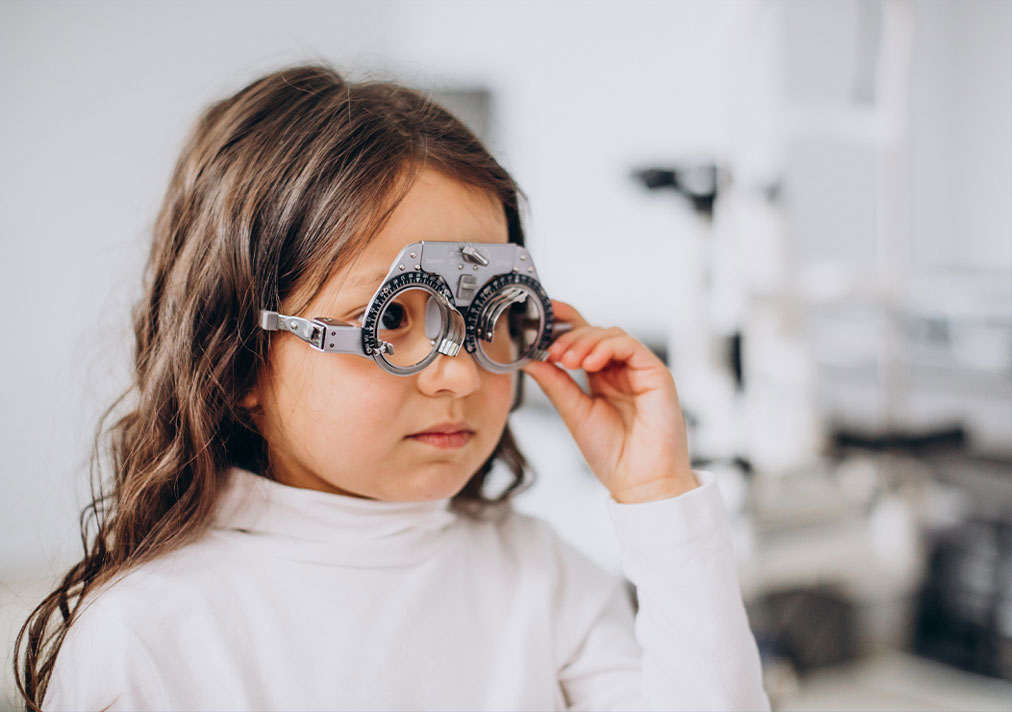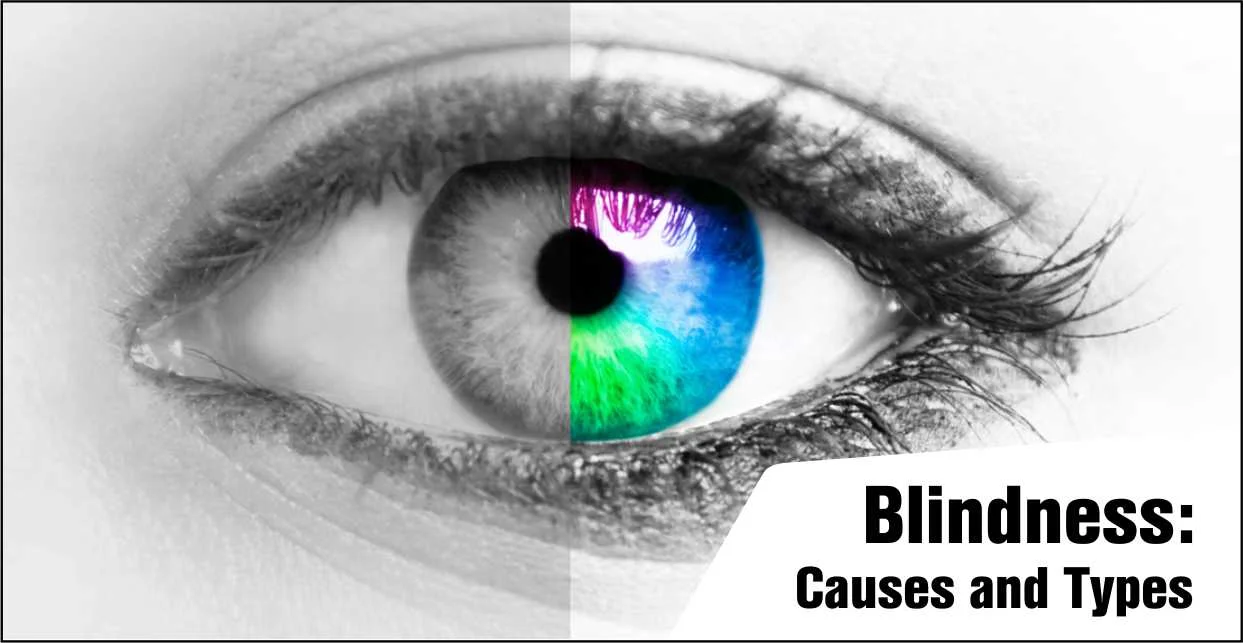What are the Leading Causes of Blindness?
When defining the causes of blindness, there are primarily two categories that one needs to be aware of. The incidence of blindness can either be congenital (present at birth) or acquired due to diseases, trauma, or age-related degeneration.
To better understand the causes and how it leads to blindness, let us walk you through all the causes in detail:
1. Cataract
Studies and reports indicate that cataract is the leading cause of blindness in India, contributing to around 66.2% blindness, according to the National Blindness and Visual Impairment Survey India. This is usually more prevalent in individuals above the age of 50.
Cataract occurs when the lens of the eye becomes cloudy, preventing light from passing clearly to the retina, leading to symptoms like:
- Blurred vision
- Faded colors
- Difficulty seeing at night
- Sensitivity to light
However, cataract is a treatable condition and vision can be restored if the surgery is done on time and with precision. At Eye-Q Hospital, we specialise in advanced cataract surgeries with high-precision tools that not only ensure success but rapid recovery.
2. Glaucoma
Described as the “silent thief of sight,” glaucoma is another one of the leading causes of blindness in India. The condition occurs when there is an elevated intraocular pressure, which, in turn, compresses the optic nerve, leading to eventual and gradual vision loss.
One thing about glaucoma is that it is a progressive disease and if not treated on time, the vision loss is irreparable. The easiest way to diagnose glaucoma early is by getting eye pressure screening if you feel discomfort or pain in the eyes.
Some of the common risk factors include diabetes, hypertension, family history, age, etc. Early interventions with medication or surgery can prevent further worsening and prevent vision loss.
3. Diabetes Retinopathy
Uncontrolled diabetes not only impacts the nerves in the legs and extremities but also impacts vision, more specifically, the retina. In diabetic retinopathy, the uncontrolled glucose levels in the blood affect the blood vessels in the retina, leading to symptoms like swelling, bleeding and eventual vision loss.
Some of the common symptoms are:
- Floaters
- Blurry vision
- Impaired color perception
Beyond managing diabetes, the condition can also be treated with a lot of other interventions like laser therapy, anti-VEGF injections, etc. These prevent progression of the retinopathy, preserving vision.
4. Age-Related Macular Degeneration (AMD)
Right after cataract, another one of the leading reasons behind acquired blindness in India is due to AMD. As the name suggests, the condition affects the macula, which is the central part of the retina. Usually more common in people over the age of 60, the condition affects people’s ability to read, write or even distinguish objects in a distance.
Depending on the progression of the disease, there are two types of AMD. For example, if there is a gradual thinning of the macula, it is known as “Dry AMD”. However, if there is abnormal blood vessel growth around the macula, it is categorised as “Wet AMD.”
The condition doesn’t have a definitive cure but medical interventions can proactively slow down the disease progression and ensure that there is no permanent vision loss.
5. Retinitis Pigmentosa
Although fairly less talked about, retinitis pigmentosa is a rare, genetic disorder that impairs the retina’s ability to respond to light. Individuals that have this condition are born with vision but eventually as they age, they start to lose their vision gradually.
Usually, the vision loss is gradual, starting with loss of night vision, then peripheral vision and so on. However, since it is a genetic disorder, the condition can’t be treated and cured entirely.
Some of the symptoms include:
- Night blindness in early childhood
- Loss of side vision
- Sensitivity to light
Despite the lack of cure available, the condition can be managed through low-vision aids and rehabilitation to improve the patient’s quality of life, ensuring they don’t lose their independence entirely.
6. Infections or Inflammation in the Eyes
Several kinds of bacterial, viral infections can lead to vision loss (both temporary or permanent). Infections like trachoma, toxoplasmosis, keratitis, or even ocular tuberculosis have direct impact on the eye structure, blood vessels and the nerves in the surrounding, leading to potential risks of blindness if not treated on time.
The best way to prevent infections is by ensuring that you are following good hygiene, paying attention to any symptoms that might see off, and prioritising safe and clean drinking water.
7. Corneal Diseases and Injuries
Not just the retina and macula, even your cornea is sensitive and any damage or disease to this structure can contribute to vision loss.
Some of the common corneal diseases include corneal ulcers, infections, or trauma, which can cloud the cornea or the lesions can lead to potential risks of blindness. If you wear contact lenses quite often, ensure that you are practicing good hygiene when wearing and taking them off. It is the leading cause of corneal infections.
Also, Vitamin A deficiency is associated with corneal diseases, so include foods or supplements that are enriched with this vitamin. In case of severe or advanced corneal damage or disease, there are leading treatments like corneal transplantation and corneal procedures, which are done at Eye-Q Hospitals to help restore vision in many cases.
Preventing Blindness: What Can You Do?
Now that you have a detailed understanding of the causes of blindness and the different types of blindness, it is quite essential we also walk you through the preventive measures.
Studies indicate that around 75% of the acquired blindness can be avoided through early diagnosis, regular check-ups and timely treatment.
Some of the preventive tips to ensure optimal eye health and vision are:
- Don’t miss out on regular eye exams, even if you feel like you have 20/20 vision and there isn’t anything wrong with your sight.
- If you have chronic metabolic disorders like diabetes and hypertension, prioritise managing them.
- Ensure that you are eating a diet that is nutritious and enriched with Vitamin A, C, E, and omega-3 fatty acids for supporting eye health.
- When stepping out of your home during the day, especially in peak summer, consider wearing UV-protective sunglasses.
- Not just for adults, ensure that even children are getting regular eye examination and vaccinations to prevent complexities down the line.
- Avoid self-medication or overuse of eye drops, especially the ones that are available over the counter.
- If you wear contact lenses, practice good hygiene and ensure that the liquid it is submerged in is uncontaminated.
Protect and Preserve Your Eyesight with Eye-Q Hospitals!
If you have concerns about your vision, have a family history of eye disease, or have a systemic condition like diabetes or hypertension, don’t delay your eye examination. Early detection and intervention can make a world of difference in preventing vision loss.
Visit Eye-Q EYE Hospital to know more about our services, find a centre near you, and schedule your comprehensive eye examination today.




